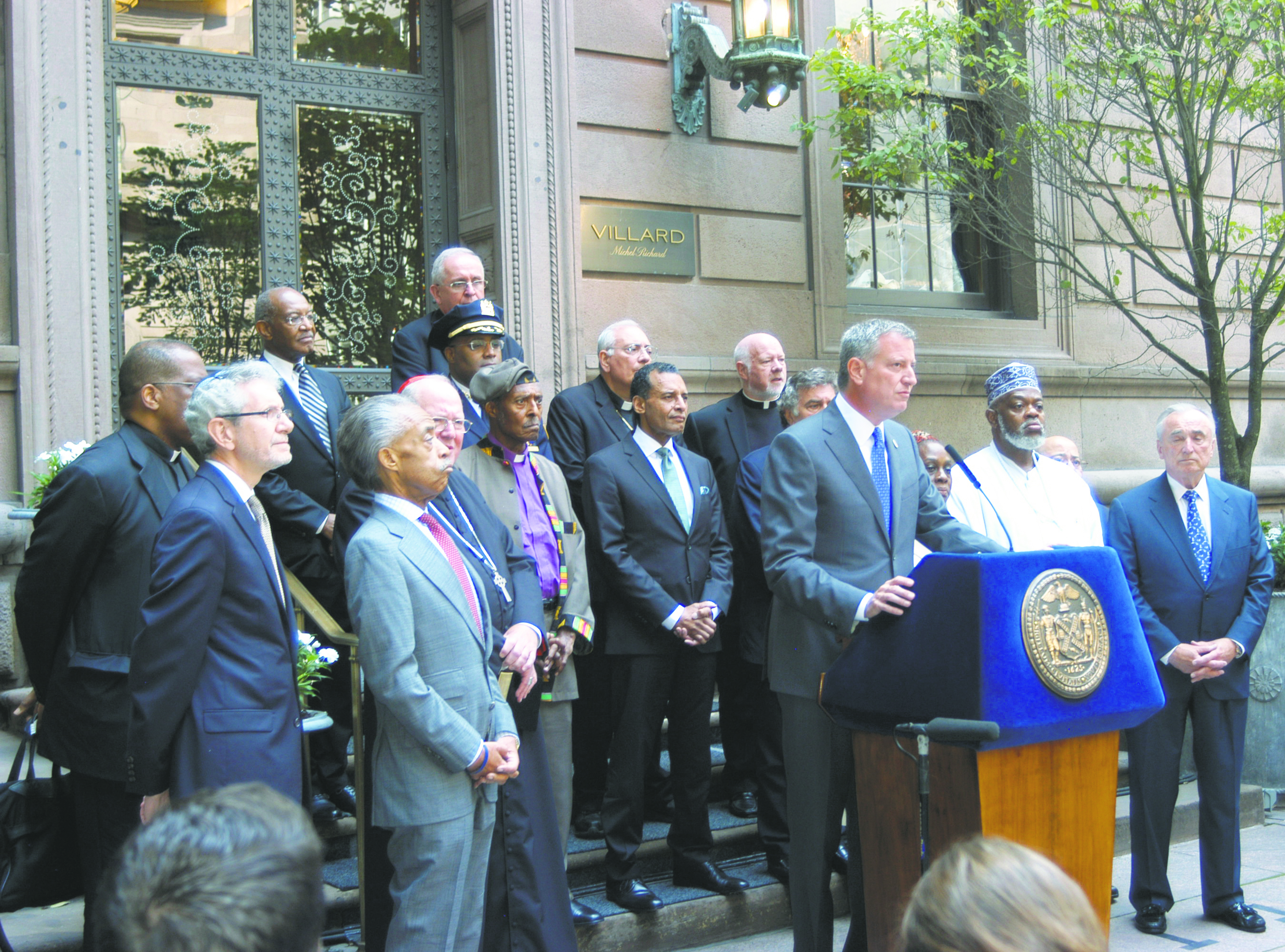By Marie Elena Giossi
Finding ways to heal and strengthen relations between police and local communities was the focus and goal of a gathering of faith leaders hosted by Cardinal Timothy Dolan at the request of Mayor Bill de Blasio this month.

Bishop Nicholas DiMarzio was among a dozen religious leaders from across the city that met privately for two hours inside the cardinal’s Manhattan residence Aug. 21.
Other participants included the Rev. Al Sharpton, Imam Talib Al-Hajj Abdur Rashid, Rev. Dr. James Forbes and Rabbis Michael Miller and Joseph Potasnik. Mayor de Blasio and first lady Chirlane McCray, NYPD Police Commissioner William Bratton and Department Chief Philip Banks sat in on the gathering.
“The goal of the meeting was to talk about how we move the city to the future, how we put behind us divisions, how we bring police and community together,” the mayor said at a press conference following the meeting. “We acknowledge the absolutely essential role of faith communities – of faith leaders – in that process.”
He appreciated the reasoning, compassion and reaching out that occurred in the closed-door session and said, “It is a template for where we need to go as a city.”
The meeting was held in anticipation of last Saturday’s demonstration in the Tompkinsville section of Staten Island to protest the death of local resident Eric Garner, who died of an apparent chokehold in police custody July 17. Scheduled to coincide with the 25th anniversary of Yusef Hawkins’ death in Bensonhurst, the rally remained peaceful.
The faith leaders also came together nearly two weeks after the fatal police shooting of Missouri teenager Michael Brown, which sparked racially charged riots in the St. Louis suburb of Ferguson.
A St. Louis native, Cardinal Dolan said the events in Ferguson are “high in my prayers.”
“Religion in this great city is the cause of bringing people together,” said Cardinal Dolan. “It’s a bridge; it’s the source of reconciliation and peace and unity.”
“We want to be a light to the world,” he added. “The Bible calls us to do that, and I think that’s what this morning was all about.”
Laying a Foundation
The mayor noted that the meeting was not about a single incident, namely the death of Eric Garner, nor about being mired in the past. Rather, it was about laying a foundation for change by making a series of fundamental reforms.
“For our police, the mission will be to protect and respect,” he said, noting that the department is working to reduce unnecessary stops, offer more oversight and training as well as provide more support and resources to the nearly 35,000 uniformed officers who serve and safeguard citizens in the five boroughs.
As for the faith leaders, they’ll meet on an ongoing basis and work on the grassroots level, using their churches, synagogues and mosques, to develop what Rabbi Miller termed the three “R’s” – respect, relationships and reconciliation – between their congregations, especially the youth, and local police officers.
One suggestion was for houses of worship to hold a day of recognition for civil servants, especially police officers, firefighters and teachers, so congregations can thank them but also promote respect and meet under positive circumstances.
Healing and moving forward, de Blasio said, “can’t happen in this city without faith communities.
“It’s just a core reality that that extra level … of change and progress only happens with the full involvement of these leaders and so many others that they represent.”
Jesuit Father Gregory Chisholm, pastor of St. Charles Borromeo Church, Harlem, who participated in the session, believes the local Catholic Church has the power to effect that “change and progress” under the guidance of Cardinal Dolan and Bishop DiMarzio.
“They have extreme influence on civic life, on social and cultural life and certainly on religious life within this city,” he said.
“because Catholic churches are usually so firmly based in communities, we have the opportunity of reaching beyond the borders of our own Catholic community.”
Addressing the deep-seated misunderstanding and distrust between neighborhood police and residents is a matter that requires “prayer, understanding and reflecting,” Bishop DiMarzio said following the press conference.
Service for Peace, Reconciliation
To that end, he noted that the Brooklyn Diocese is holding an ecumenical service for peace and reconciliation at St. Peter Claver Church, Bedford-Stuyvesant, Sept. 6 at 3 p.m. The service is being organized by Msgr. Paul Jervis, pastor of St. Martin de Porres parish, Bedford-Stuyvesant.
Police officers and people of all faiths are invited.
